人教版七年级下册英语各单元知识点汇编
- 格式:pdf
- 大小:55.78 KB
- 文档页数:8
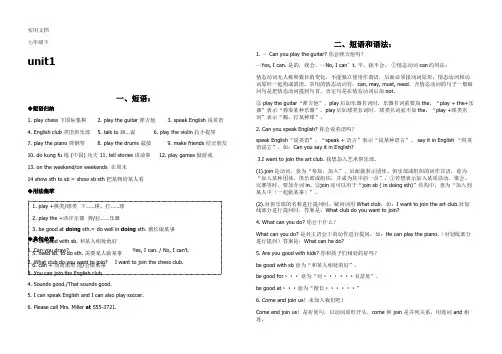
七年级下unit1一、短语:◆短语归纳1. play chess 下国际象棋2. play the guitar 弹吉他3. speak English 说英语4. English club 英语俱乐部5. talk to 跟…说6. play the violin 拉小提琴7. play the piano 弹钢琴8. play the drums 敲鼓9. make friends 结交朋友10. do kung fu 练 (中国) 功夫 11. tell stories 讲故事 12. play games 做游戏13. on the weekend/on weekends 在周末14 show sth to sb = show sb sth 把某物给某人看◆用法集萃◆典句必背1. Can you draw? Yes, I can. / No, I can’t.2. What club do you want to join? I want to join the chess club.3. You can join the English club.4. Sounds good./That sounds good.5. I can speak English and I can also play soccer.6. Please call Mrs. Miller at 555-3721.二、短语和语法:1. — Can you play the guitar? 你会弹吉他吗?—Yes, I can. 是的,我会。
—No, I can’t. 不,我不会。
①情态动词can的用法:情态动词无人称和数目的变化,不能独立使用作谓语,后面必须接动词原形,情态动词和动词原形一起构成谓语。
常用的情态动词有:can, may, must, need。
含情态动词的句子一般疑问句是把情态动词提到句首,否定句是在情态动词后加not。
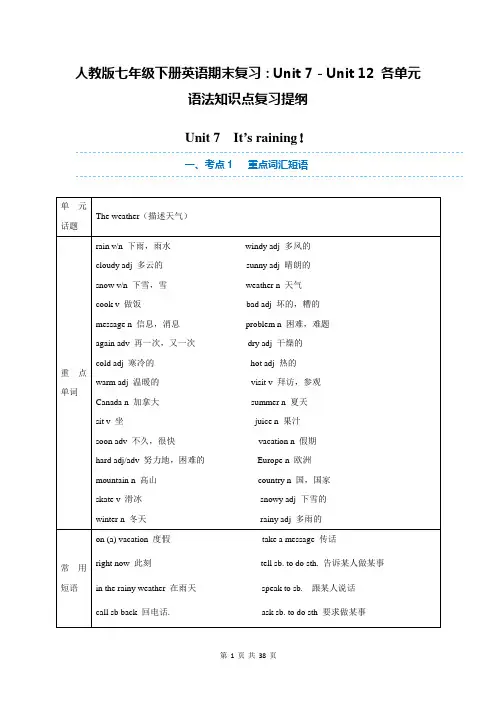
人教版七年级下册英语期末复习:Unit 7-Unit 12 各单元语法知识点复习提纲Unit 7 It’s raining!一、考点1 重点词汇短语1 messagemessage为可数名词,意为“消息,信息”,take a message for sb.“为某人捎个口信”。
拓展:give sb. a message 捎信给某人,leave a message 留口信,get the message 明白对方的意思。
Can I take a message for him?当某人发现要找的人不在或接电话的人发现打电话者要找的人不在时,常用此语2 could 情态动词意为“能,可以“,表示请求许可,在语气上比can委婉客气,但这种句式的肯定回答用can。
Could you just tell him to call me back?3 call及物动词,意为“打电话给”。
call sb. (up) “打电话给某人”,call sb. at +电话号码,意为“拨打……找某人”。
拓展:call 是一个多义词,call sb 可表示“叫醒某人,呼唤某人”;give sb. a call 给某人打电话。
4 back副词“回来,回原处,向后”;call sb. back给某人回个电话。
【即学即练】I’ll _____you _____.我将给你回电话。
5 visit此处用作及物动词,意为“拜访,探望”,后接表示人的名词或代词。
visit还可意为“参观,游览”,后接表示地点的名词。
拓展:visit还可用作可数名词,意为“访问,参观,拜访。
be on a visit to ... “正在访问/参观……”。
visitor参观者,游览者,游客。
I’m having a great time visiting my aunt in Canada._____ my grandparents every year at Christmas.我每年圣诞节都去探望我的祖父母。
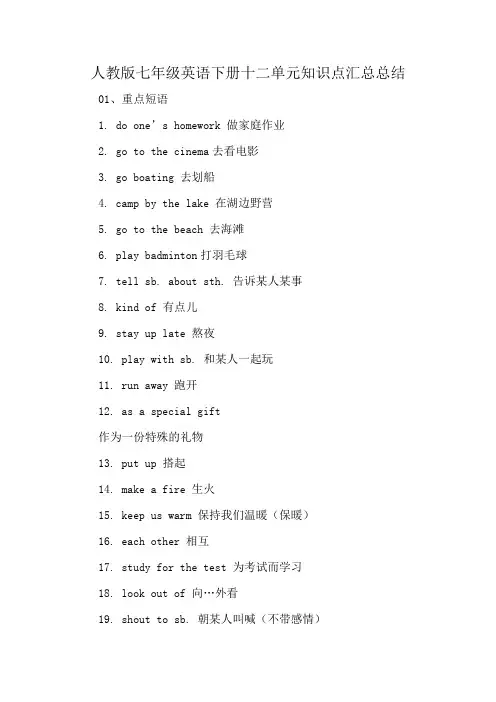
人教版七年级英语下册十二单元知识点汇总总结01、重点短语1. do one’s homework 做家庭作业2. go to the cinema去看电影3. go boating 去划船4. camp by the lake 在湖边野营5. go to the beach 去海滩6. play badminton打羽毛球7. tell sb. about sth. 告诉某人某事8. kind of 有点儿9. stay up late 熬夜10. play with sb. 和某人一起玩11. run away 跑开12. as a special gift作为一份特殊的礼物13. put up 搭起14. make a fire 生火15. keep us warm 保持我们温暖(保暖)16. each other 相互17. study for the test 为考试而学习18. look out of 向…外看19. shout to sb. 朝某人叫喊(不带感情)20. shout at sb. 朝某人叫喊(带感情)21. jump up and down 跳上跳下22. a second language 第二语言23. finish high school中学毕业24. get a surprise 吃惊25. work as a guide 做导游工作26. wake sb. up 弄醒某人02、重点句子Grammar Focus 句子1.What did you do last weekend?你上周末做了什么事情?2. I did my homework. / We went boating. 我做了家庭作业。
/ 我们去划船了。
3. Who visited her grandma?Becky did.谁去看望了她的奶奶?Becky去了。
4. Where did she go last weekend?她上周末去了哪里?5. She went to a farm.她去了一个农场。
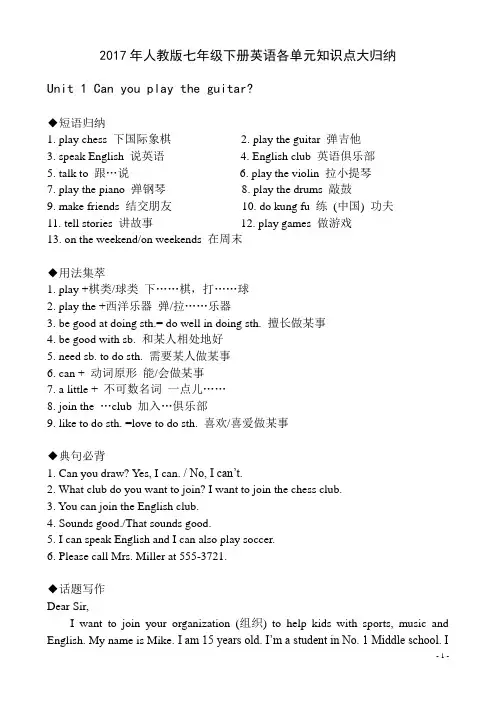
2017年人教版七年级下册英语各单元知识点大归纳Unit 1 Can you play the guitar?◆短语归纳1. play chess 下国际象棋2. play the guitar 弹吉他3. speak English 说英语4. English club 英语俱乐部5. talk to 跟…说6. play the violin 拉小提琴7. play the piano 弹钢琴8. play the drums 敲鼓9. make friends 结交朋友10. do kung fu 练(中国) 功夫11. tell stories 讲故事12. play games 做游戏13. on the weekend/on weekends 在周末◆用法集萃1. play +棋类/球类下……棋,打……球2. play the +西洋乐器弹/拉……乐器3. be good at doing sth.= do well in doing sth. 擅长做某事4. be good with sb. 和某人相处地好5. need sb. to do sth. 需要某人做某事6. can + 动词原形能/会做某事7. a little + 不可数名词一点儿……8. join the …club 加入…俱乐部9. like to do sth. =love to do sth. 喜欢/喜爱做某事◆典句必背1. Can you draw? Yes, I can. / No, I can’t.2. What club do you want to join? I want to join the chess club.3. You can join the English club.4. Sounds good./That sounds good.5. I can speak English and I can also play soccer.6. Please call Mrs. Miller at 555-3721.◆话题写作Dear Sir,I want to join your organization (组织) to help kids with sports, music and English. My name is Mike. I am 15 years old. I’m a student in No. 1 Middle school. Ican play the guitar well. I can sing many songs. I can swim and speak English well, too. I think I can be good with the kids. I also do well in telling stories.I hope to get your letter soon.Yours,MikeUnit 2 What time do you go to school?◆短语归纳1. what time 几点2. go to school 去上学3. get up 起床4. take a shower 洗淋浴5. brush teeth 刷牙6. get to 到达7. do homework 做家庭作业8. go to work 去上班9. go home 回家10. eat breakfast 吃早饭11. get dressed 穿上衣服12. get home 到家13. either…or…要么…要么…14. go to bed 上床睡觉15. in the morning/ afternoon/ evening 在上午/下午/晚上16. take a walk 散步17. lots of=a lot of 许多,大量18. radio station 广播电台19. at night 在晚上20. be late for=arrive late for 迟到◆用法集萃1. at + 具体时间点在几点(几分)2. eat breakfast/ lunch/dinner 吃早饭/午饭/晚饭3. thirty\half past +基数词……点半4. fifteen\a quarter to +基数词差一刻到……点5. take a/an +名词从事……活动6. from …to …从……到……7. need to do sth 需要做某事◆典句必背1. What time do you usually get up? I usually get up at six thirty.2. That’s a funny time for breakfast.3. When do students usually eat dinner? They usually eat dinner at a quarter to seven in the evening.4. In the evening, I either watch TV or play computer games.5. At twelve, she eats lots of fruit and vegetables for lunch..6. She knows it’s not good for her, but it tastes good.7. Here are your clothes.◆话题写作主题:谈论日常作息习惯My School DayI am a student. I usually get up at seven, and I eat breakfast at seven thirty. Then I go to school at eight. School starts at eight thirty. I eat lunch at twelve. I go home at 17:00. I often eat dinner at 19:00 and then play the piano. I do my homework at 20:00. At 22:00, I go to bed.Unit 3 How do you get to school?◆短语归纳1. get to school 到达学校2. take the subway 乘地铁3. ride a bike 骑自行车4. how far 多远5. from home to school 从家到学校6. every day 每天7. take the bus 乘公共汽车8. by bike 骑自行车9. bus stop 公共汽车站10. think of 认为11. between …and …在…和…之间12. one 11-year-old boy 一个11岁的男孩13. play with …和…玩14. come true 实现15. have to 不得不◆用法集萃1. take…to …= go to …by…乘…去…2. How do / does (sb)get to …? …是怎样到…的?3. How far is it from …to …? 从…到…有多远?4. It takes sb. some time to do sth. 做某事花费某人多长时间。
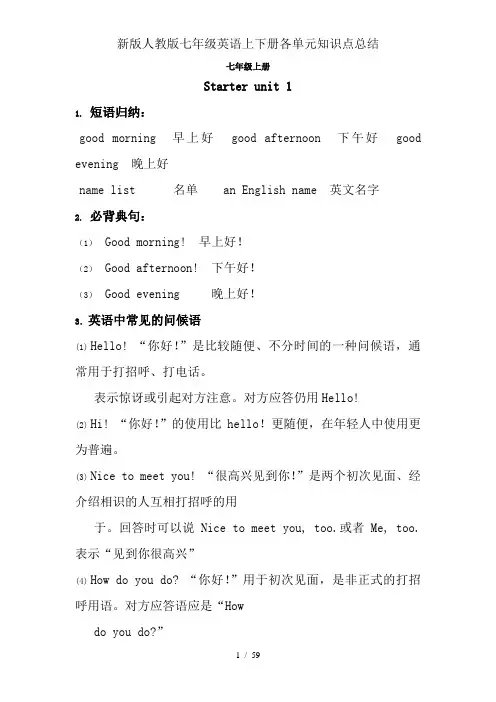
七年级上册Starter unit 11.短语归纳:good morning 早上好good afternoon 下午好good evening 晚上好name list 名单 an English name 英文名字2.必背典句:(1)Good morning! 早上好!(2)Good afternoon! 下午好!(3)Good evening 晚上好!3.英语中常见的问候语(1)Hello! “你好!”是比较随便、不分时间的一种问候语,通常用于打招呼、打电话。
表示惊讶或引起对方注意。
对方应答仍用Hello!(2)Hi! “你好!”的使用比hello!更随便,在年轻人中使用更为普遍。
(3)Nice to meet you! “很高兴见到你!”是两个初次见面、经介绍相识的人互相打招呼的用于。
回答时可以说Nice to meet you, too.或者Me, too.表示“见到你很高兴”(4)How do you do? “你好!”用于初次见面,是非正式的打招呼用语。
对方应答语应是“Howdo you do?”(5)How are you? 表示问候How are you? 意为“你好吗?”,为询问对方身体状况的问候语,应答语一般是“I’m fine.Thank you. / I’m very well. Thank you. / I’m OK.How are you? 的其他用法:习惯上回答完别人的问候后,常可反问对方的身体状况,此时可用How are you?也可用And you? “你呢?”4.大写字母的用法:(1) 在英语中,句子的第一个单词的第一个字母都应大写。
Sit down, please. 请坐。
(2)字母I作人称代词时,意为“我”,在句中任何位置都必须大写。
日常用语“OK”在句中任何位置都大写。
I’m a student. 我是一名学生。
Is everything OK? 一切都好吗?(3)人名、地名、国名、某国人或某种语言等专有名词的第一个字母都必须大写。
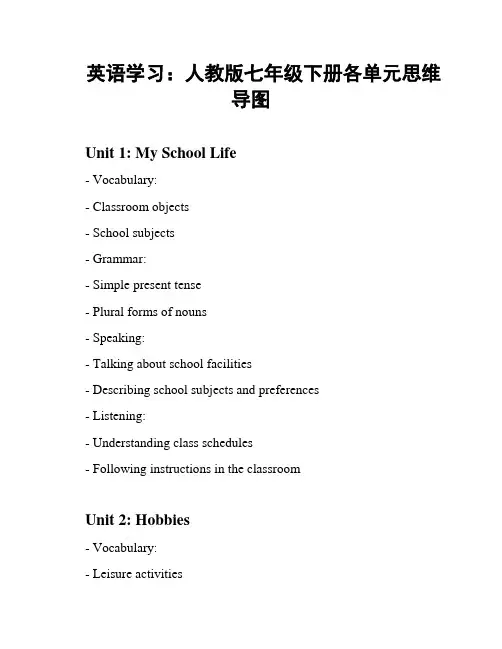
英语学习:人教版七年级下册各单元思维导图Unit 1: My School Life- Vocabulary:- Classroom objects- School subjects- Grammar:- Simple present tense- Plural forms of nouns- Speaking:- Talking about school facilities- Describing school subjects and preferences- Listening:- Understanding class schedules- Following instructions in the classroomUnit 2: Hobbies- Vocabulary:- Leisure activities- Sports and games- Grammar:- Present continuous tense- Adverbs of frequency- Speaking:- Talking about hobbies and interests- Discussing preferences and dislikes- Listening:- Understanding conversations about hobbies- Following instructions for games and activitiesUnit 3: At Home- Vocabulary:- Rooms and furniture- Daily routines- Grammar:- Present simple tense- Prepositions of place- Speaking:- Describing rooms and houses- Talking about daily routines- Listening:- Understanding conversations about household chores - Following instructions for recipes and tasksUnit 4: Food and Drink- Vocabulary:- Types of food and drinks- Quantifiers- Grammar:- Countable and uncountable nouns- How much/How many- Speaking:- Talking about food preferences- Ordering food at a restaurant- Listening:- Understanding conversations about meals and recipes - Following instructions for cooking and servingUnit 5: Family and Friends- Vocabulary:- Family members- Personal pronouns- Grammar:- Possessive adjectives- Wh-questions- Speaking:- Introducing family members- Describing relationships- Listening:- Understanding conversations about family activities- Following instructions for interviews and introductionsUnit 6: At the Zoo- Vocabulary:- Animals and their characteristics- Adjectives to describe animals- Grammar:- There is/are- Speaking:- Talking about animals and their habitats- Listening:- Understanding conversations about zoo visits - Following directions for finding animalsUnit 7: The Weather- Vocabulary:- Weather conditions- Seasons and months- Grammar:- Present continuous for future arrangements - Adjectives to describe weather- Speaking:- Talking about weather in different seasons - Making plans based on weather forecasts- Listening:- Understanding weather reports- Following instructions for outdoor activitiesUnit 8: Holidays- Vocabulary:- Festivals and celebrations- Holiday activities- Grammar:- Past simple tense- Time expressions- Speaking:- Talking about past holidays and celebrations- Describing holiday traditions- Listening:- Understanding conversations about holiday experiences - Following instructions for crafts and gamesUnit 9: Around Town- Vocabulary:- Places in a city- Directions and locations- Grammar:- Imperatives- Giving and following directions- Speaking:- Asking for and giving directions- Describing places in a city- Listening:- Understanding conversations about city attractions - Following directions to different locationsUnit 10: Health and Fitness- Vocabulary:- Body parts and health issues- Sports and exercises- Grammar:- Present continuous for future arrangements- Imperatives for instructions- Speaking:- Talking about health and fitness routines- Giving advice on healthy habits- Listening:- Understanding conversations about health problems - Following instructions for exercises and workouts。
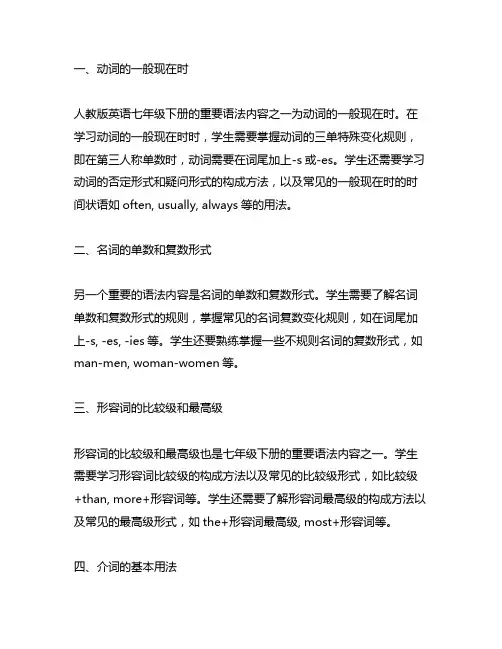
一、动词的一般现在时人教版英语七年级下册的重要语法内容之一为动词的一般现在时。
在学习动词的一般现在时时,学生需要掌握动词的三单特殊变化规则,即在第三人称单数时,动词需要在词尾加上-s或-es。
学生还需要学习动词的否定形式和疑问形式的构成方法,以及常见的一般现在时的时间状语如often, usually, always等的用法。
二、名词的单数和复数形式另一个重要的语法内容是名词的单数和复数形式。
学生需要了解名词单数和复数形式的规则,掌握常见的名词复数变化规则,如在词尾加上-s, -es, -ies等。
学生还要熟练掌握一些不规则名词的复数形式,如man-men, woman-women等。
三、形容词的比较级和最高级形容词的比较级和最高级也是七年级下册的重要语法内容之一。
学生需要学习形容词比较级的构成方法以及常见的比较级形式,如比较级+than, more+形容词等。
学生还需要了解形容词最高级的构成方法以及常见的最高级形式,如the+形容词最高级, most+形容词等。
四、介词的基本用法介词是英语中一个重要的语法内容,学生需要掌握介词的基本用法,包括介词表示地点、时间、方向、原因等的用法,以及介词与动词、名词、形容词的搭配。
学生还需要学习一些常用介词的用法,如in, on, under, behind, between等。
五、情态动词情态动词是七年级下册的另一个重要语法内容。
学生需要了解情态动词can, could, may, might, must, shall, should, will, would等的用法和意义,并能正确运用这些情态动词进行句子的构成。
学生还需要学习情态动词的否定形式和疑问形式的构成方法。
六、并列连词和从属连词七年级下册还包括并列连词和从属连词的学习。
学生需要了解并掌握一些常见的并列连词如and, but, or等的用法,以及从属连词如because, when, if, although等的用法。
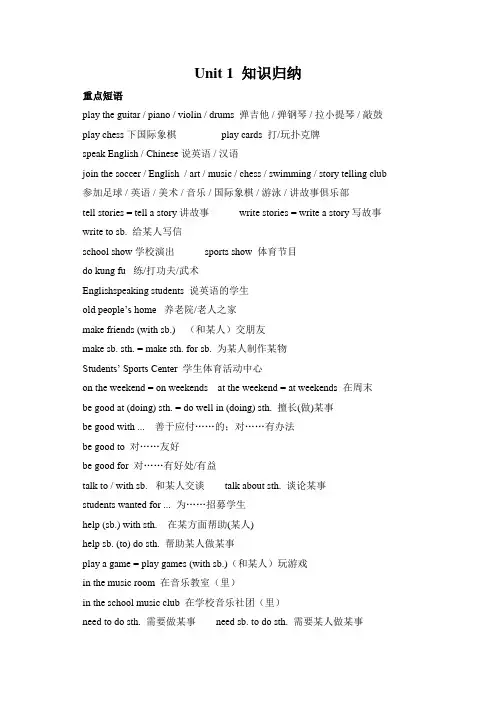
Unit 1 知识归纳重点短语play the guitar / piano / violin / drums 弹吉他 / 弹钢琴 / 拉小提琴 / 敲鼓play chess 下国际象棋play cards 打/玩扑克牌speak English / Chinese 说英语 / 汉语join the soccer / English / art / music / chess / swimming / story telling club 参加足球 / 英语 / 美术 / 音乐 / 国际象棋 / 游泳 / 讲故事俱乐部tell stories = tell a story 讲故事write stories = write a story 写故事write to sb. 给某人写信school show 学校演出sports show 体育节目do kung fu 练/打功夫/武术Englishspeaking students 说英语的学生old people’s home养老院/老人之家make friends (with sb.) (和某人)交朋友make sb. sth. = make sth. for sb. 为某人制作某物Students’ Sports Center学生体育活动中心on the weekend = on weekends at the weekend = at weekends 在周末be good at (doing) sth. = do well in (doing) sth. 擅长(做)某事be good with ... 善于应付……的;对……有办法be good to 对……友好be good for 对……有好处/有益talk to / with sb. 和某人交谈talk about sth. 谈论某事students wanted for ... 为……招募学生help (sb.) with sth. 在某方面帮助(某人)help sb. (to) do sth. 帮助某人做某事play a game = play games (with sb.)(和某人)玩游戏in the music room 在音乐教室(里)in the school music club 在学校音乐社团(里)need to do sth. 需要做某事need sb. to do sth. 需要某人做某事want to do sth. 想要做某事want sb. to do sth. 想要某人做某事show sb. sth.= show sth. to sb. 给某人看某物tell sb. sth.= tell sth. to sb. 告诉某人某事tell sb. to do sth. 告诉某人做某事tell sb. about sth. 告诉某人关于某事(的情况)teach sb. sth. 教某人某物teach sb. to do sth. 教某人做某事重点句型:含有情态动词can的肯定句,否定句,一般疑问句和特殊疑问句情态动词can: 表示能力,意为“_____/_____”,can的否定就是在其后加“______”,写作“___________/____”,情态动词后必须加“________”含有情态动词的肯定句变为否定句:()含有情态动词的肯定句变为一般疑问句:()句式结构语法知识1.辨析4个“说”2.构词法v.+er/or n. 与此动作相关的人或职业play()teach()swim()drive()write()dance()sing()read()work()speak()talk()练一练1.I can play the drums.(变为一般疑问句并做肯定回答)____________________________________________________________________________________________________2.Mr. Wu can’t speak English well.(变为肯定句)__________________________________________________3.Peter can dance and sing.(对划线部分提问)__________________________________________________4.Li Hua can help you with your math this morning.(对划线部分提问)__________________________________________________5.Li Hua can help you with your math this morning.(对划线部分提问)__________________________________________________6.Linda can go to the supermarket with her mom.(对划线部分提问)__________________________________________________7.Linda can go to the supermarket with her mom.(对划线部分提问)__________________________________________________8.You can ask Miss. Li for help.(对划线部分提问)__________________________________________________9. Can your friends finish their homework every day? (做肯定回答并变为陈述句)____________________________________________________________________________________________________10.Jim’s father can keep (保持 ) good eating habits. (对划线部分提问)__________________________________________________11.Can you tell me his phone number? (做否定回答并变为肯定句)____________________________________________________________________________________________________12.I can have 5 apples for lunch. (对划线部分提问)__________________________________________________13.I can buy a book for you. (变为一般疑问句并做否定回答)____________________________________________________________________________________________________14.Linda can play the violin well because she has a good violin teacher.(对划线部分提问)__________________________________________________15.I and my friend can get to Chengdu next week.(对划线部分提问)__________________________________________________16.Mike can play puter games and watch TV when his parents are not at home.(对划线部分提问)__________________________________________________17.Li Hua likes to join all kinds of(各种各样的)clubs because he wants to make friends. (对划线部分提问)__________________________________________________18.The students in the school can have lunch on the third floor(楼).(对划线部分提问)__________________________________________________19.The students in the school can have lunch on the third floor(楼).(变为一般疑问句并做否定回答)____________________________________________________________________________________________________20.Jason can play the erhu. (对划线部分提问)__________________________________________________。
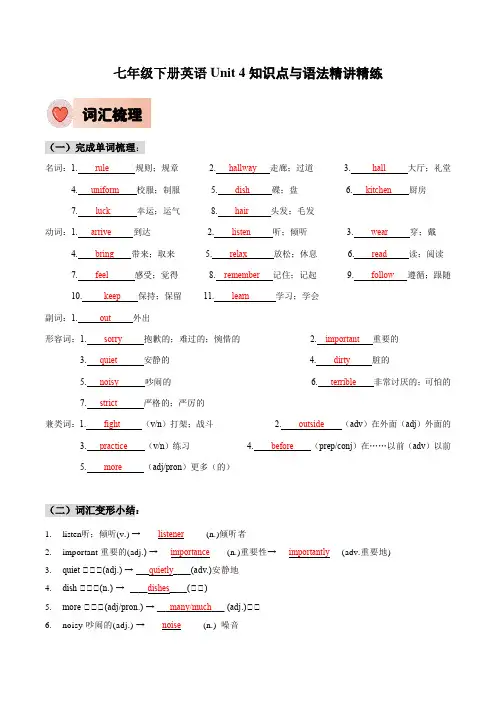
七年级下册英语Unit 4知识点与语法精讲精练词汇梳理(一)完成单词梳理:名词:1. rule规则;规章 2. hallway 走廊;过道 3. hall 大厅;礼堂4. uniform 校服;制服5. dish 碟;盘6. kitchen 厨房7. luck 幸运;运气8. hair 头发;毛发动词:1. arrive 到达 2. listen 听;倾听 3. wear 穿;戴4. bring 带来;取来5. relax 放松;休息6. read 读;阅读7. feel 感受;觉得8. remember 记住;记起9. follow 遵循;跟随10. keep 保持;保留11. learn 学习;学会副词:1. out 外出形容词:1. sorry 抱歉的;难过的;惋惜的 2. important 重要的3. quiet 安静的4. dirty 脏的5. noisy 吵闹的6. terrible 非常讨厌的;可怕的7. strict 严格的;严厉的兼类词:1. fight (v/n)打架;战斗 2. outside (adv)在外面(adj)外面的3. practice (v/n)练习4. before (prep/conj)在……以前(adv)以前5. more (adj/pron)更多(的)(二)词汇变形小结:1.listen听;倾听(v.) → ___listener____ (n.)倾听者2.important 重要的(adj.) → __importance___ (n.)重要性→ __importantly__ (adv.重要地)3.quiet 安安安(adj.)→ ___quietly____(adv.)安静地4.dish 安安安(n.) →____dishes____(安安)5.more 安安安(adj/pron.) → ___many/much___ (adj.)安安6.noisy 吵闹的(adj.) → ___noise____ (n.) 噪音7.relax 安安安安安(v.) → ___relaxing____ (adj.)安安安安安 → ___relaxed____ (adj.)安安安8.read 安(v.) → ____reader____ (n.)安安安9.terrible 安安安(adj.) → ___terribly____ (adv.) 可恶地10.feel 感受;觉得(v.) → ___feeling_____ (n.) 感觉11.luck 幸运;运气(n.) → ____lucky_____ (adj.) 幸运的→ ___luckily____ (adv.) 幸运地12.keep 保持;保留(v.) → ____keeper____ (n.) 保管人;饲养员【练一练】用所给词的适当形式填空1.We don’t like these ____rules_____ (rule). They are too strict.2.Ling Ling often helps her mother do the ____dishes____ (dish) after dinner.3.Look at the sign on the wall, “Be ____quiet_____ (quietly) in the library!”4.Mr. Green is very busy. He can’t ____relax_____ (relaxing) even on weekends.5.David has to do his homework ____first_____ (one) when he is at home.6.Please don’t be ____noisy_____ (noise). The baby is sleeping.7.Listening to music can make us feel ____relaxed____ (relax).8.It is __important___ (importance) for students to listen carefully in class.9.Tom always ___arrives____ (arrive) at school ahead of time(提前). He is a good student.10.He is always ready to help others and he thinks ____more____ (much) of others than himself.(三)短语攻关:(be) on time 准时in the dining hall 在餐厅里listen to music 听音乐in class 在课堂上a lot of 许多;很多bring ... to ... 把……带到……have to 必须;不得不school uniform 校服keep/be quiet 保持安静go out 外出(娱乐)do the dishes 清洗餐具help sb. do sth. 帮助某人做某事learn to do sth. 学着去做某事make rules 制定规章制度make one’s bed 铺床good luck 祝你好运be strict (with sb.) (对某人)要求严格follow the rules 遵守规则知识点梳理1. Don’t arrive late for class. 上课不要迟到。

—-可编辑修改,可打印——别找了你想要的都有!精品教育资料——全册教案,,试卷,教学课件,教学设计等一站式服务——全力满足教学需求,真实规划教学环节最新全面教学资源,打造完美教学模式七年级上册Starter unit 11.短语归纳:good morning 早上好 good afternoon 下午好 good evening 晚上好name list 名单 an English name 英文名字2.必背典句:(1)Good morning! 早上好!(2)Good afternoon! 下午好!(3)Good evening 晚上好!3.英语中常见的问候语(1)Hello! “你好!”是比较随便、不分时间的一种问候语,通常用于打招呼、打电话。
表示惊讶或引起对方注意。
对方应答仍用Hello!(2)Hi! “你好!”的使用比hello!更随便,在年轻人中使用更为普遍。
(3)Nice to meet you! “很高兴见到你!”是两个初次见面、经介绍相识的人互相打招呼的用于。
回答时可以说Nice to meet you, too.或者Me, too.表示“见到你很高兴”(4)How do you do? “你好!”用于初次见面,是非正式的打招呼用语。
对方应答语应是“How do you do?”(5)How are you? 表示问候How are you? 意为“你好吗?”,为询问对方身体状况的问候语,应答语一般是“I’m fine. Thank you. / I’m very well. Thank you. / I’m OK.How are you? 的其他用法:习惯上回答完别人的问候后,常可反问对方的身体状况,此时可用How are you?也可用And you? “你呢?”4.大写字母的用法:(1) 在英语中,句子的第一个单词的第一个字母都应大写。
Sit down, please. 请坐。
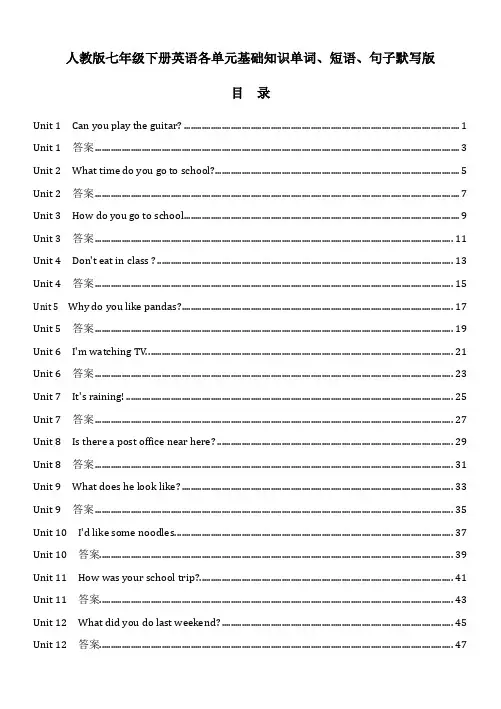
人教版七年级下册英语各单元基础知识单词、短语、句子默写版目录Unit 1 Can you play the guitar? (1)Unit 1 答案 (3)Unit 2 What time do you go to school? (5)Unit 2 答案 (7)Unit 3 How do you go to school (9)Unit 3 答案 (11)Unit 4 Don't eat in class ? (13)Unit 4 答案 (15)Unit 5 Why do you like pandas? (17)Unit 5 答案 (19)Unit 6 I'm watching TV (21)Unit 6 答案 (23)Unit 7 It's raining! (25)Unit 7 答案 (27)Unit 8 Is there a post office near here? (29)Unit 8 答案 (31)Unit 9 What does he look like? (33)Unit 9 答案 (35)Unit 10 I'd like some noodles (37)Unit 10 答案 (39)Unit 11 How was your school trip? (41)Unit 11 答案 (43)Unit 12 What did you do last weekend? (45)Unit 12 答案 (47)Unit 1 Can you play the guitar?A部分重点单词★ 根据汉语提示默写出下列单词1.吉他n.2.唱歌v.3.游泳v. & n.4.跳舞v. 舞蹈n.5.画v.6.国际象棋n.7.说(某种语言);说话v.8.参加; 加入v.9.俱乐部; 社团n.10.讲述;告诉v.11.故事;小说n.12.写作;写字v.13.演出; 节目n. 给…展示v.14.或者;也不conj.15.说话;交谈v. & n.16.(中国)功夫n.★ 写出下列单词变形1.write⎼______________(名词)作家2.tell⎼______________(名词)3.draw⎼______________(名词)4.swim⎼______________(名词)游泳者5.story⎼______________(复数)6.speak⎼______________(名词)7.sing⎼______________(名词)歌手8.dance⎼______________(名词)跳舞者重点短词★ 根据汉语提示默写出下列短语1.下国际象棋2.说英语3.弹吉他4.加入音乐俱乐部5.游泳俱乐部6.美术俱乐部7.运动俱乐部8.讲故事俱乐部9.擅长于……10.喜欢画画11.跟某人说话12.在音乐室里13.学校演出14.向我们展示一下重点句子★ 根据汉语提示默写出下列句子1.我想加入美术俱乐部。
人教版七年级英语下册知识点归纳姓名学校班级2017年人教版七年级下册英语各单元知识点大归纳Unit 1 Can you play the guitar?一、词汇拓展1. sing(现在分词)singing2. dance(现在分词)dancing3. swim(现在分词)swimming4.draw(同义词)paint5. story(复数)stories6. Write(同音词)right7. drum(复数)drums 8. piano(复数)pianos 9. also(同义词)too/either 10.make(单三)makes (现在分词)making 11. Center(形容词)central12.teach(名词)teacher 13. musician(形容词)musical二、重点短语与句型1. play chess 下国际象棋 speak English 说英语play the guitar 弹吉它want to do…想做……2. be good at 擅长于 what club /sports 什么俱乐部 /运动G7BU1p1music /swimming /sports club 音乐/游泳/运动俱乐部be good at doing sth.= do well in doing sth. 擅长做某事like to do …喜欢做… What about…?…怎么样?be good at doing…擅长做… tell stories讲故事the story telling club 讲故事俱乐部G7BU1p23. talk to 跟…..说 write stories 写小说want …for the school show为学校表演招聘…… after school放学后do kung fu 打中国功夫 come and show us 来给我们表演G7BU1p34. play the drum 敲鼓 play the piano弹钢琴play the violin 拉小提琴 G7BU1p45. be good with 善于应付(处理)…的;和某人相处很好make friends 结交朋友 help sb. with sth在某方面帮助某人on the weekend 在周末 help with...帮助做……be free /busy 有空/很忙call sb. at…拨打某人的……号码need sb./sth. to do…需要某人/某物做……English-speaking students说英语的学生G7BU1p5join…… the club加入…俱乐部,be in=joi n in …成为…中的一员G7BU1p6三、关键句型1. Can you draw? Yes, I can. / No, I can’t.2. What club do you want to join? I want to join the chess club.3. You can join the English club. Sounds good.4. I can speak English and I can also play soccer.5. Please call Mrs. Miller at 555-3721.◆话题写作Dear Sir,I want to join your organization (组织) to help kids with sports, music and English. My name is Mike. I am 15 years old. I’m a student in No. 1 Middle school.I can play the guitar well. I can sing many songs. I can swim and speak English well, too. I think I can be good with the kids. I also do well in telling stories.I hope to get your letter soon.Yours,Mike Unit 2 What time do you usually go to school?一、词汇拓展1. up(反义词)down2. brush(单三)brushes3. tooth(复数)teeth4. always(反义词)never5.early(反义词)late6. work(同义词)job7. night(反义词)day 8. half(复数)halves 9. run(现在分词)running10. clean(现在分词)cleaning 11. either…or… (反义词)neither …nor…12. life(复数)lives 13. taste(单三)tastes二、重点短语与句型1.get up 起床,站起 get dressed穿上衣服 have/take a shower 洗淋浴brush teeth涮牙 eat breakfast 吃早餐 What time 几点,何时go to school 去学校 do homework 做家庭作业G7BU2p72. at night 在晚上from…to…从……到…… G7BU2p8in the morning 在上午 go to work 去上班That's a funny time for…那是做……有意思的时间。
最新人教版七年级下册英语各单元知识点复习Unit 1 Can you play the guitar?1,情态动词+V原 can do= be able to docan的用法歌诀can可用来表能力,但与实动不分离。
不管主语何变换,can的模样永不变。
只要句中出现can,动词原形后面站。
一般疑问can提前,否定can后not添。
2,Play+ the+ 乐器 play the violin/piano/drums (乐器前加the) Play +球类,棋类 play football play chess (球类和棋类前省略the)3,join 参加社团、组织、团体 take part in :参加运动、活动 join sb. 加入某人4,4个说的区别:say+内容:say it in English 用英语说它speak+语言:speak English 说英语talk 谈论 talk about sth. 谈论某事 talk with/to sb 和某人交谈tell 告诉,讲述 tell sb. (not)to do sth 告诉某人(不)去做某事(tell a story) tell stories/ jokes 讲故事/笑话5,want的用法:想要(动词)(1)want to do sth.= would like to do sth 想要做某事(2)want (sb)to do sth.= would like +(sb)to do sth 想要做某事6,4个也的区别:too 肯定句末(前面加逗号)either否定句末(前面加逗号)also 句中,放在实意动词前,be 动词和情态动词之后as well 口语中(前面不加逗号)7,be good at =do well in+ V-ing/N. 擅长于(做)…… be good at playing soccer用法拓展:be good for 对…有益(be bad for对…有害)be good to 对…友好(good 可用friendly,nice,kind替换) be good with和…相处好=get on/ along well with8,特殊疑问句的构成:疑问词+一般疑问句9,How/ what about+V-ing …怎么样?(表建议)What aboutplaying basketball ?10,感官动词(look, sound, taste, smell, feel)+adj/ like 11.选择疑问句:回答不能直接用Yes或者No,要从中选择一个回答Can you play the piano,,the drums,or the guitar? Ican play the drums.我会打鼓12,students wanted for school show学校演出招募学生(wanted 表示招募,含有被动意义)13,show sth to sb=show sb sth 给某人看某物 show me your book=show your book to meon show,意为“在展出”give sth to sb=give sb sth 给某人某物 give me a pen =give a pen to me14,help sb (to)do sth 帮助某人做某事help sb with sth 帮助某人某事with sb’s help= with the help of sb 在某人的帮助下help oneself to 随便享用15,be busy doing sth= be busy with sth 忙于做某事,be busy doing his homework= be busy with his homework忙于他的家庭作业16,sb. need to do sth 某人需要做某事 need sb. to do sth 需要某人做某事17,be free= have time 有空的 be busy 忙碌的18,make friends 交朋友 make friends with sb. 与某人交朋友19,call sb at +电话号码给某人打---电话20,on the weekend= on weekends 在周末21,English-speaking students 说英语的学生(带有连词符,有形容词性质)22,do kung fu表演功夫23,in, on和at在表达时间方面的区别①in+年、月、季节;泛指在上午,下午,晚上,如:in the morning(afternoon, evening).in spring 在春季 in September 在九月②on指在某一天或某一天的上午,下午,晚上,具体到某一天、节日如:on Monday, on Sunday afternoon, on July 1, 1999 on New Year’s Day③at,一般表示点时间,如at six o’clock, at three thirty.、习惯用法:at night, at noon,注意:在英语中,如果时间名词前用this, last, next 等修饰时,像这样的表示,“在某时”的时间短语前,并不需要任何介词。
Unit 1 Can you play the guitar?1.play chess 下国际象棋play the guitar 弹吉他2.speak English 说英语English club 英语俱乐部3.talk to 跟…说play the violin 拉小提琴4.play the piano 弹钢琴play the drums 敲鼓5.make friends 结交朋友6.do kung fu 会(中国)功夫7.tell stories 讲故事play games 做游戏8.on the weekends (在)周末用法集萃play +棋类/球类下……棋,打……球1.play the +西洋乐器弹/拉……乐器2.be good at doing sth.= do well in doing sth.擅长做某事3.be good with sb. 善于与某人相处4.need sb. to do sth. 需要某人做某事5.can + 动词原形能/会做某事6.a little + 不可数名词一点儿……7.join the …club 加入…俱乐部8..like to do sth. =love to do sth. 喜欢/喜爱做某事like ding sth.喜欢做某事典句必背1.Can you draw? Yes, I can. / No, I can’t.2 .What club do you want to join?3. I want to join the chess club.4.You can join the English club. Sounds good.5.I can speak English and I can also play soccer.6.Please call Mrs. Miller at 555-3721.重点句子点拨:1、Can you play the guitar?你会弹吉他吗?点拨1:can是情态动词,它的意思是能、会,表示某人具有做某事的能力,情态动词后必须用动词原形,情态动词can 没有人称和数的变化。
1 / 8 人教版七年级下册英语各单元知识点汇编Unit 1 Can you play the guitar? ◆短语归纳1. play chess 下国际象棋2. play the guitar 弹吉他3. speak English 说英语4. join the swimming club 参加游泳俱乐部5. talkto 主动跟…说话6. talk with与…说话7. play the piano 弹钢琴8. play the drums 敲鼓9. make friends with与朋友10. do kung fu 练(中国) 功夫11. tell stories=tell a story 讲故事12. play games 做游戏13. on the weekend/on weekends 在周末14 want to do 想要去做15 music(音乐)-musician(音乐家)◆用法集萃
1. play +棋类/球类下……棋,打……球[不戴帽子] 2. play the +乐器弹/拉……乐器[戴帽子] 3. be good at doing sth.= do well in doing sth. 擅长做某事4. need sb. to do sth. 需要某人做某事5. be good with sb. 和某人相处地好be good for 有利于6. can + 动词原形能/会做某事[can是照妖镜] 7. a little + 不可数名词一点儿……8. join the …club 加入…俱乐部;9. like to do sth. =love to do sth.=like doing=enjoy doing 喜欢/喜爱做某事come to my school ◆典句必背8. Are you free?=Do you have time? 1. Can you draw? Yes, I can. / No, I can’t.2. What club do you want to join? I want to join the chess club. 3. You can join the English club. 4. Sounds good./That sounds good. 5 What can you do? 6. I can speak English and I can also play soccer. 7. Please call Mrs. Miller at 555-3721. 8.tell sb (not)to do 告诉某人(不)要去做某事。
Unit 2 What time do you go to school? ◆短语归纳1. what time 几点(具体时间)when (具体时间或不具体时间)2. go to school 去上学3. get up 起床4. take a shower 洗淋浴5. brush teeth 刷牙6. get to 到达7. do homework 做家庭作业 8. go to work 去上班9. go home 回家(home是副词,前不加to)10. eat breakfast=have breakfast 吃早饭11. get dressed 穿上衣服12. get home 到家13. either…or… 要么…要么…14. go to bed 上床睡觉15. take a walk 散步16. in the morning/ afternoon/ evening 在上午/下午/晚上17. lots of=a lot of 许多,大量(加可数名词复数或者不可数名词)18. radio station 广播电台19. at night 在晚上20. be late for=arrive late for 迟到◆用法集萃1. at + 具体时间点2. eat breakfast/ lunch/dinner吃早饭/午饭/晚饭play sports=do sports 做运动3. thirty\half past +基数词…点半seven thirty= half past seven 4. fifteen\a quarter to +基数词差一刻到……点seven fifteen= a quarter past seven; seven forty-five= a quarter to eight 5. from …to …从……到……6. need to do sth需要做某事7 either…or…或者或者(就近原则)Either you oryour father likes English. 8 take a walk=go for a walk=have a walk散步9 eat quickly吃得快,quickly是副词,修饰动词eat 10.单词复数tooth-teeth;foot-feet; 脚goose-geese鹅11.job只能作为可数名词,work可作为不可数名词,还作为动词12 half an hour 半小时
◆典句必背1. What time do you usually get up? I usually get up at six thirty. 2. That’s a funny time for breakfast.3. When do students usually eat dinner? They usually eat dinner at a quarter to seven in the evening. 4. I either watch TV or play computer games.5. At twelve, she eats lots of fruit and vegetables for lunch.. 6. She knowsit’s not good for her, but it tastes good. 宾语从句7. Here are your clothes.倒装句
Unit 3 How do you get to school? ◆短语归纳1. get to school=arrive at school 到达学校2. take the subway 乘地铁3. ride a bike 骑自行车4. how far 多远5. from home to school 从家到学校6. every day 每天everyday日常的7. take the bus 乘公共汽车8. leave Beijing for Shanghai 离开北京到上海9. bus stop 公共汽车站10. think of 认为11. between … and … 在…和…之间12. one 11-year-old boy 一个11岁的男孩13. play with … 和…玩14. come true 实现15. have to 不得不(客观事实)must 强调主观必须◆用法集萃1. take… to …= go to … by… 乘…去…I take the bus to school.=I go to school by bus.2. How do / does (sb)get to …? …是怎样到…的?How does Mingming get to school? 3. How far is it from … to ? 从…到…有多远?(询问距离,发配)on foot 步行4. It takes sb. some time/money to do sth. 做某事花费某人多长时间或多少钱。5. How long does it take to do sth.?花费多长时间?(时间段)go on a ropeway 乘索道6. It is + adj. + to do sth. 做某事是….It 是形式主语,不定式是真正的主语7. Thanks for + n. / doing 感谢你(做)某事。He is like a father to me.【like】是介词,表示“像”8 What do you think of the movie?=How do you like the movie?你认为这部电影总么样?
◆典句必背1. How do you get to school? I ride my bike to school. 2. How far is it from your home to school? 3. How long does it take you to get to school? 4. For many students, it is easy to get to school. 【many】只加可数名词复数5. be afraid of sth,害怕某事,某物;be afraid to do sth.害怕做某事6 There is no bridge. [no]=not a(an)=not any 7.[3 hundred] 3百不加s, hundreds of 数以百计的加s 8 stop doing sth.停止正在做的事情,例如:Stop talking! stop to do sth.停下来去做另一件事情。
Unit 4 Don’t eat in class. ◆短语归纳1. on time 准时,按时in time及时2. listen to music 听音乐listen与hear区别,listen只是听得动作,hear是听到的结果,如I listen carefully,but I hear nothing. 我仔细听,但是我什么也没听到。3. in class 在课上in the classroom在教室里4. be late for 迟到=arrive late for 5. go out 外出(娱乐)